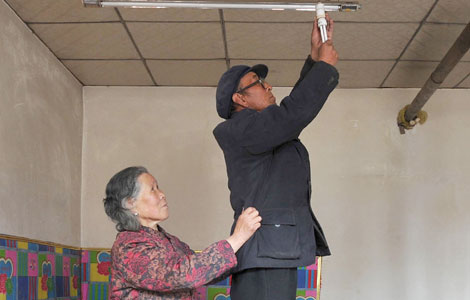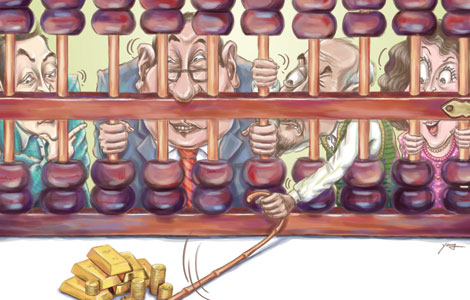Asset declaration system to be improved
Updated: 2013-05-28 01:34
By Zhao Yinan (China Daily)
|
|||||||||||
China is considering improving the method used for asset declaration, as a research report has revealed that the deterrence power of the current system is not strong, an expert said.
Tian Guoliang, a professor at the Party School of the Central Committee of the Communist Party of China, said the Party's discipline inspection commission is mulling ways to strengthen the property declaration system, through which government officials declare their assets to a higher authority.
"Although the country issued a regulation on property declaration in 1995, the stipulations need to be improved. One prominent problem is that the authority can hardly verify the authenticity of the information being declared by officials," he said.
The research conducted by Tian showed that more than 63 percent of corrupt provincial officials still get promoted even after they take bribes, since the higher authority was not aware of their illegal behavior or opted to turn a blind eye to it.
But the anti-graft authority plans to improve the asset declaration system, said the professor, who was invited to take part in the authority's seminars that aim to solicit opinions on the issue.
One of the methods being considered by the authorities, he said, is to build up a database that includes the property status of government officials who hold the most sensitive positions, such as in the power, rail and banking sectors.
"The database automatically collects property information about these officials and their close relatives from financial institutions, instead of the current method which asks officials to fill in a form manually. Once there are major changes to the property status, the system will alert anti-graft authorities."
Tian said inspections of officials' property status are especially important when officials are about to be promoted.
"Many officials might have made some achievements during their political career, but that does not necessarily mean they are immune to corruption. A capable official can also be a grafter," he said.
Tian's research, in which he analyzed 103 cases of corruption involving provincial, ministry and State leaders, showed those holding more public resources - such as banks, railways and telecommunications - are more vulnerable to corruption.
The research shows that although most of the officials began taking bribes in the 1990s, their illegal behavior was only exposed after 2005.
"It means many officials have escaped the supervision of the property declaration system, which was put into effect in 1995," he said.
In January, Gong Aiai, former vice-president of a rural commercial bank in a county in Shaanxi province, was found to have purchased 41 houses in Beijing, many more properties than she could afford with her salary.
Jiang Ming'an, an administrative law professor at Peking University, said he expects the central government to empower disciplinary authorities to verify the property information declared by officials.
"So far no one has been punished for declaring false information," he said.
Related Stories
Spot checks on officials' asset declarations may curb corruption 2013-01-24 22:02
Guangzhou to push forward officials' asset disclosure 2013-02-21 01:14
Curbs on asset inquiries draw fire 2013-02-20 07:14
Guangdong requires officials disclose assets 2013-01-28 17:19
Proposals call for publication of officials' assets 2013-01-24 23:50
Today's Top News
China tourists spend more
China's industrial profit up 9.3% in April
Li, Merkel vow to settle trade dispute
Charity denies fund embezzlement
Scrutiny urged to curb graft
China to enhance AU partnership
Radiation leak in Japan affects many
China, Germany vow to deepen cooperation
Hot Topics
Lunar probe , China growth forecasts, Emission rules get tougher, China seen through 'colored lens', International board,
Editor's Picks

|

|

|

|

|

|





